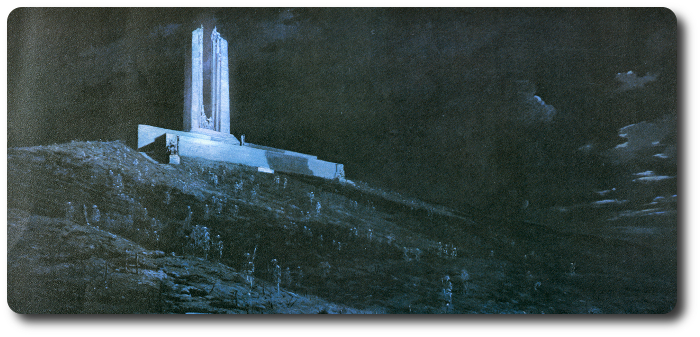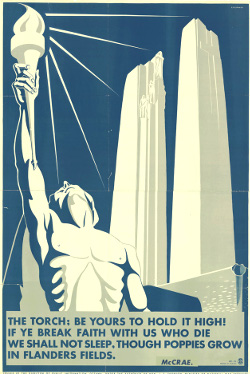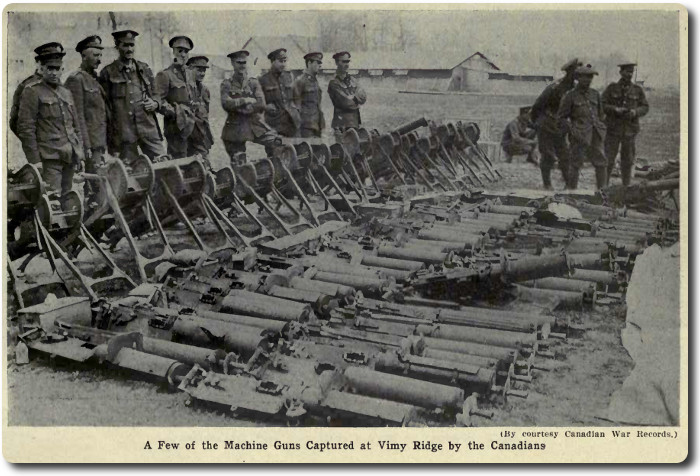Topic: CEF

40 Years Ago Today Canadians Took Vimy (1957)
Ottawa Citizen, 9 April 1957
By David McIntosh, Canadian Press Staff Writer
 April 9, 1917, was Easter Monday.
April 9, 1917, was Easter Monday.
On that day in France Zero Hour was 5:30 a.m. Sleet swept over the countryside, changing to blinding snow as that bloody day of glory wore on.
Under a thunderous barrage by 983 field, heavy and siege guns, the men crawled out of their shell holes, tunnels and trenches and swept forward through the mud, wire and murderous chatter of the machine-guns.
The Canadian Corps did not halt until it had captured Vimy Ridge. The Ridge never fell from Allied hands during the rest of the First World War.
Forever Canada
In fact, 248 acres of the Ridge remain forever Canada. This plot on Hill 145 was ceded to Canada in perpetuity by the French nation. On it, July 26, 1936, in the presence of 8,000 Canadians, King Edward VIII unveiled the Vimy Memorial on which are inscribed, in English and French, these words:
"To the valour of their countrymen in the Great War and in memory of their 60,000 dead this monument is raised by the people of Canada”
Vimy Ridge forms a barrier nine miles long across the western edge of the Douai Plain. The northern end rises abruptly to a height or 200 feet. Southwards, the main body of the Ridge rises another 150 feet to the main summit, Hill 145.
The French tried to retake Vimy in December, 1914, and failed. They tried again with 18 Divisions—more than 250,000 me—in the spring of 1915 and were repulsed again, suffering 100,000 casualties in six weeks while inflicting 80,000 casualties on the Germans.
Fall Third Time
In the fall of 1915 the French tried yet again to take Vimy. They advanced only 200 yards and suffered 40,000 casualties.
The Canadian Corps took over the sector in the fall of 1916. In January. 1917, elaborate preparations began for an Allied spring offensive.
The frontage of the Canadian Corps for the attack on Vimy was 7,000 yards. Across this whole front, to a depth of 700 yards, the German field works comprised three lines of trenches protected by dense belts of barbed wire. Behind this was another network of trenches and wire linking concrete machine-gun forts and on the crest were more belts of wire.
There were 97,184 Canadians in the Corps. The four Canadian divisions faced six German divisions on the Ridge.
Heavy Bombardment
The artillery bombardment before the assault lasted two weeks. Never before had the Canadians engaged in such a set-piece attack. Under Corps Commander Lt.-Gen. Sir Julian Byng (later Baron Byng of Vimy, Governor General of Canada), a full-scale plan of the battlefield was laid out in the rear area on which the troops rehearsed repeatedly.
The Canadians, on 9 April, downed a tot of rum and went over the top.
Across the mass of shell holes, craters and churned mud of No Man's Land they swept in wave afater wave. Despite the terrible bombardment, the Germans fought doggedly and many had to be killed in hand-to-hand fighting.
In 35 minutes, the 1st Division under maj.-Gen. Arthur Currie (later Gen. Sir Arthur Currie) had carried its first objective.
The 2nd Division (Maj.-Gen. E.H. Burstall) and 3rd Division (Maj.-Gen. L.J. Lipsett) had equal success.

Suffer Heavily
Hill 145 was taken by the 4th Division (Maj.-Gen. D. Watson) after first being checked by machine-gun fire and suffering heavily. Consolidation of the position proceeded through April 10 and two days later The Pimple, last feature on Vimy held by the Germans, was carried by the 10th Brigade.
The Canadian suffered 11,297 casualties. Of these, one third were killed and one-third were knocked out of the war.
The is no record of total German casualties but two German divisions lost more than 3,000 men each.
The importance of the Canadian capture of Vimy did not become wholly apparent until the great German offensive in the spring of 1918. Vimy, held by the Canadians, was the only part of the Allied line between Rhiems and Ypres, a distance of 125 miles, which did not yeild.

